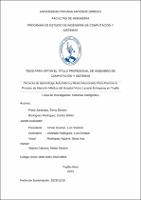| dc.contributor.advisor | Abanto Cabrera, Heber Gerson | |
| dc.contributor.author | Pulce Janampa, Tomy Gerson | |
| dc.contributor.author | Rodríguez Rodríguez, Carlos Wilder | |
| dc.creator | Pulce Janampa, Tomy Gerson | |
| dc.date.accessioned | 2024-02-12T17:40:07Z | |
| dc.date.available | 2024-02-12T17:40:07Z | |
| dc.date.issued | 2024 | |
| dc.identifier.uri | https://hdl.handle.net/20.500.12759/21111 | |
| dc.description.abstract | En base a un estudio que se realizó en el Perú, se identificó que la atención en los
hospitales se veía afectada por largas filas, lo que ocasionaba largas horas de espera
para obtener una cita y ser atendidos, o incluso no obtener una cita. Durante la pandemia
del Covid-19, el Centro Nacional de Telemedicina atendió más de un millón de consultas
virtuales en todo el país, generando cerca de 160,000 citas médicas en línea en el mes
de junio. También se comprobó que, en el sector privado, aproximadamente el 33% de
los asegurados rechazaba o posponía citas médicas virtuales debido a la desconfianza
en el medio o la falta de conocimiento en tecnología.
El Hospital ““Víctor Lazarte Echegaray““ presentaba problemas en la asignación de
consultorios, médicos y personal de apoyo, lo que dificultaba la asignación adecuada de
citas según la prioridad de cada paciente. Esta situación se reflejaba en protestas por
parte del personal médico y denuncias de los pacientes.
El objetivo general de la investigación fue desarrollar un software basado en redes
neuronales que priorizara el proceso de atención médica en el Hospital Víctor Lazarte
Echegaray, utilizando técnicas de aprendizaje automático para la asignación de citas
médicas. También se plantearon objetivos específicos, como el análisis del estado del
arte en técnicas de procesamiento de datos, la limpieza y preparación de los datos para
el entrenamiento del modelo de red neuronal, el establecimiento de reglas para la
asignación de citas y la integración del software con la red neuronal entrenada.
La implementación de un sistema basado en redes neuronales y aprendizaje automático
mejoró la asignación de prioridad a los pacientes y redujo el diferimiento de citas
médicas en el Hospital Víctor Lazarte Echegaray.
Esta investigación abordó con éxito un problema crítico en la atención médica y mejoró
significativamente la calidad de los servicios de salud en el hospital mencionado. | es_PE |
| dc.description.abstract | Based on a study conducted in Peru, it was identified that healthcare in hospitals
was adversely affected by long queues, resulting in extended waiting times to
secure appointments, or even the failure to obtain an appointment. During the
Covid-19 pandemic, the National Telemedicine Center attended to over a million
virtual consultations across the country, generating approximately 160,000 online
medical appointments in the month of June. It was also found that in the private
sector, approximately 33% of insured individuals rejected or postponed virtual
medical appointments due to distrust in the medium or a lack of technological
knowledge.
The ““Víctor Lazarte Echegaray““ Hospital faced challenges in the allocation of
consulting rooms, medical personnel, and support staff, which hindered the
proper assignment of appointments based on each patient's priority. This
situation manifested in protests by medical staff and patient complaints.
The general objective of this research was to develop a neural network-based
software that prioritized the medical care process at the Víctor Lazarte Echegaray
Hospital, using machine learning techniques for the allocation of medical
appointments. Specific objectives included conducting a state-of-the-art analysis
of data processing techniques, data cleaning and preparation for neural network
model training, establishing rules for appointment allocation, and integrating the
software with the trained neural network.
The implementation of a system based on neural networks and machine learning
improved the prioritization of patients and reduced the deferral of medical
appointments at the Víctor Lazarte Echegaray Hospital.
This research successfully addressed a critical issue in healthcare and
significantly enhanced the quality of healthcare services at the mentioned
hospital | es_PE |
| dc.description.uri | Tesis | es_PE |
| dc.format | application/pdf | es_PE |
| dc.language.iso | spa | es_PE |
| dc.publisher | Universidad Privada Antenor Orrego | es_PE |
| dc.relation.ispartofseries | T_SIST_1532 | |
| dc.rights | info:eu-repo/semantics/embargoedAccess | es_PE |
| dc.rights.uri | https://creativecommons.org/licenses/by/4.0/ | es_PE |
| dc.source | Universidad Privada Antenor Orrego | es_PE |
| dc.source | Repositorio Institucional - UPAO | es_PE |
| dc.subject | Atencion Medica | es_PE |
| dc.subject | Asignacion de Citas | es_PE |
| dc.title | Técnicas de aprendizaje automático y redes neuronales para priorizar el proceso de atención médica del Hospital Víctor Lazarte Echegaray en Trujillo | es_PE |
| dc.type | info:eu-repo/semantics/bachelorThesis | es_PE |
| thesis.degree.level | Título Profesional | es_PE |
| thesis.degree.grantor | Universidad Privada Antenor Orrego. Facultad de Ingeniería | es_PE |
| thesis.degree.name | Ingeniero de Computación y Sistemas | es_PE |
| thesis.degree.discipline | Ingeniería de Computación y Sistemas | es_PE |
| dc.subject.ocde | https://purl.org/pe-repo/ocde/ford#2.02.04 | es_PE |
| renati.advisor.orcid | https:// orcid.org/0000-0001-9320-806X | es_PE |
| renati.author.dni | 41514340 | |
| renati.author.dni | 18202654 | |
| renati.advisor.dni | 18107335 | |
| renati.type | https://purl.org/pe-repo/renati/type#tesis | es_PE |
| renati.level | https://purl.org/pe-repo/renati/level#tituloProfesional | es_PE |
| renati.discipline | 611066 | es_PE |
| renati.juror | Urrelo Huiman, Luis Vladimir | |
| renati.juror | Alvarado Rodríguez, Luis Enrique | |
| renati.juror | Rodríguez Aguirre, Silvia Ana | |
| dc.publisher.country | PE | es_PE |
| dc.date.embargoEnd | 2028-02-12 | |





